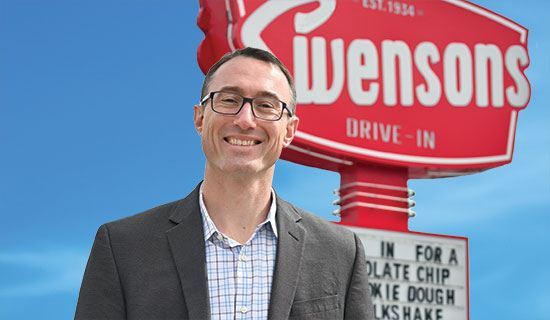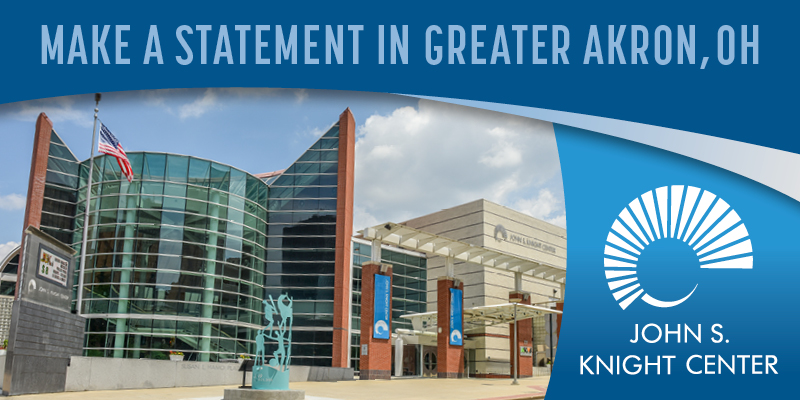When Jeff Flowers graduated from a local high school and enrolled in the University of Akron, the first thing he did — “like many Akron natives,” he says — was apply for a job at Swensons Drive-In Restaurants. As a “curb server” tasked with rushing orders out to customers’ cars “with a sprint and a smile,” Flowers quickly learned that his job wasn’t just serving handspun milkshakes or olive-topped Galley Boy burgers; it was delivering a memorable experience for every guest, every time. Ever since the iconic drive-in began flipping burgers back in 1934, Swensons has become revered both for its fresh-grilled, made-to-order meals, as well as its friendly, speedy curbside service.
“The memorable experiences created by the face-to-face interaction and sprint-and-smile service that our curb servers provide, that is the key differentiator,” Flowers says, fondly remembering his first role at the restaurant 23 years ago. “At Swensons, we like to say that you can get white tablecloth service in the most expensive seat you own. The drive-in format allows us to not only serve customizable made-to-order food, but customizable made-to-order experiences.”
Now, as CEO of the Akron-based company, Flowers is focused on scaling the quality service that Swensons is known for as the chain continues to expand throughout Ohio and beyond. Celebrating 90 years in business this year, the drive-in restaurant is embracing its longstanding legacy to fuel new growth opportunities ahead.
ADVERTISEMENT
Growth opportunity
Running a restaurant chain was never part of Flowers’ plan when he entered UA as an engineering major. But instead of pursuing a career in his field of study after he graduated, Flowers realized he’d already found his professional home at Swensons.
“I knew how much I loved the brand, and how much I enjoyed working for Swensons,” he says. “I saw so much potential and opportunity to grow and expand.”
After starting as a curb server, Flowers worked his way up to assistant manager, general manager, district manager and then vice president before stepping into the CEO role nine years ago. At that point, in 2015, Flowers shared the corporate office with four other employees, including a bookkeeper, receptionist and accounting staff, while he oversaw HR, IT, marketing and other functions throughout the business.
As Swensons expanded, so has the corporate team, which now consists of about 30 specialized positions. Steady growth has created opportunities for former curb servers like Flowers to take on bigger leadership roles throughout the company. As a result, career progression and promotion have become common stories at Swensons, where one employee, Ernestine Stallworth, celebrated 50 years of employment a few years ago. Throughout her career, she trained hundreds of fellow employees — including Flowers, as well as Akron Mayor Dan Horrigan, who attended her anniversary celebration to proclaim it “Miss E Day” in Akron.
The next-longest-tenured employee, Julie Peteya, has worked at Swensons for 26 years, while several others have celebrated a decade or more of service. Like Flowers, they started as curb servers or kitchen staff and worked their way up to regional management positions.
“What makes Swensons special is our people,” Flowers says. “The best part about our growth is that there’s more opportunities for upward mobility.”
Consistent service
When Flowers became CEO in 2015, the Akron-based chain spanned seven units. By the time Swensons opened its first unit in the Cleveland market in 2017, the brand hadn’t launched a new location for 16 years. To successfully expand the drive-in’s footprint beyond its hometown, Flowers and his team had to design a roadmap for growth.
“Swensons wasn’t growing for so long that we had to learn the entire process, from real estate site selection to building a prototype kitchen,” Flowers says. “Ultimately, the biggest hurdle was, ‘How can we ensure the consistency of our people, product and culture?’ That relentless dedication to consistently delivering memorable guest experiences is so important.”
In fact, consistency is central to Swensons’ mission “to bring joy to our hometowns — one guest, one meal and one car at a time.” As the chain expanded into Cleveland, Columbus, Cincinnati and Youngstown, Flowers relied on his managers to maintain consistency at each branch. For example, every time the company enters a new market, a senior-level manager with at least 10 years of experience relocates to lead the launch.
“Having someone that understands what makes Swensons special has been critical to expanding that same culture in new markets,” Flowers says.
Under Flowers’ leadership, Swensons has tripled in size from seven units, or “stands,” to 21 — opening the first unit outside of Ohio, in Indianapolis, last year. The chain also operates two food trucks and one ghost kitchen, also referred to as a dark kitchen, which launched during COVID exclusively to prepare online orders for third-party delivery services.
For many years, as new locations launched, employees casually shared their knowledge through informal on-the-job training.
“We had a document here or there with processes and procedures,” Flowers says, “but to streamline all of that, we had to get that legacy knowledge out of their minds, onto paper, and into systems.”
Several years ago, Swensons began formalizing its training programs with documented processes and e-learning platforms to ensure consistent procedures across the company. With dedicated positions including HR director, senior director of training, regional training manager and director of new stand openings, Swensons invested in more robust training resources to support the team’s development.
For example, the company designed an “olive ranking” system to train curb servers, inspired by the green olives skewered on top of every Galley Boy served. As trainees advance through each level of the program — whether it’s learning how to place an order or memorizing Swensons’ 18 milkshake flavors — they can “olive up” and earn an extra badge on their nametag, ultimately achieving the top-ranking Five Olive status after two years on the team.
“We’ve seen so much success with that olive ranking system for the curb servers,” Flowers says, “that we’re developing a training program to duplicate it for [other] positions, as well.”
Changing times
Historically, Swensons’ curb server training program taught a specific form of shorthand for taking orders. Servers would run these handwritten guest checks into the kitchen and yell out the order, and then sprint fresh meals back out to customers’ cars.
A couple of years ago, Swensons streamlined this process by introducing a new point-of-sale system that enables curb servers to instantly submit orders from the parking lot to the kitchen using iPads.
“The speed, efficiency and accuracy created by introducing that new system has been tremendous,” Flowers says. “But it also meant that we had to rebuild every bit of our training program centered around the old handwritten guest checks.”
Although this new system was a significant shift for servers, the experience didn’t really change the guests’ experience — which, after all, was the ultimate goal.
“We try to focus a lot of the innovation on those behind-the-scenes aspects that aren’t guest-facing,” Flowers says, “so the experience that everyone has come to know and love can be as consistent and true to the brand as ever.”
Yet, in attempts to improve the quality and consistency that Swensons’ customers expect, the company also has to consider changes that impact guests directly. Flowers recently learned just how fervently the brand’s devoted fans feel about details as simple as cutting the cheese.
Traditionally, Swensons sourced its cheese from a vendor that supplied it by the block. That meant every slice had to be cut manually in-house using a contraption that cut several slices simultaneously — but not very consistently, so the thickness of each slice varied. As volume spiked during COVID across Swensons’ growing footprint, “it really became a struggle for us to hand-slice all of that cheese and believe that we could do it consistently,” Flowers says.
In attempts to streamline the process, Swensons experimented with other slicing devices and different vendors that could provide a comparable product in pre-sliced form. After months of research and development and “a ton of taste tests with actual guests,” Flowers says, the chain rolled out a new slice of cheese.
Although it took almost a year for the feedback to escalate, the response from customers became clear when, in late 2022, an online petition signed by hundreds on Change.org implored Swensons to “bring back the original cheese.”
Flowers and his team went back to the cutting board to try other tools and formulations, but nothing matched the hand-sliced cheesiness that customers had come to expect. The chain ultimately brought back its original cheese earlier this year, and instead of changing the product or the process, Swensons “added more cheese-slicing employees,” Flowers says. “We’re doing what we’ve always done, just paying closer attention to it.”
Through the queso quandary, Flowers learned to appreciate the fervor of Swensons’ devoted “Swenatics” who felt strongly enough to speak out against the change.
“As we’ve gotten larger, we’ve really had to learn how to listen to our guests, because that’s ultimately who we’re here to serve,” he says. “We’ve had to become much more intentional with how we do that — whether that be monitoring social media reviews and online feedback, or hosting taste tests and focus groups. You just have to listen.”
Preserving a legacy of service
By consistently delivering the quality ingredients and speedy service that customers have come to expect, Swensons has expanded its footprint and its fanbase through the generations. Articulating exactly what set Swensons apart through the years was a key cornerstone in sustaining the brand’s legacy into the future.
Swensons initially defined its culture and core values through a strategic exercise in 2017, resulting in a document that captured the brand’s essence accurately, but not very concisely.
“It wasn’t something you could memorize and recite easily,” Flowers says. “We realized that if we’re going to be successful, we need to figure out how to grow our culture faster than we grow our stands. So, as much as we loved that document, we needed something more usable.”
A couple years ago, the company refreshed its culture statement by defining its mission, vision, core values and brand promises, creating a “succinct set of usable tools” to keep all 800 employees aligned.
This year, Swensons’ 90th anniversary presented a prime opportunity to further refine the longstanding brand by introducing a snappy new tagline: We Bring It.
“We bring the service, we bring the value, we bring great food; we quite literally bring it to your car,” Flowers says, pointing out that his team even goes above and beyond to bring guests customized orders that aren’t on the official menu. “It’s not just a catchphrase; it’s really the true essence of Swensons, and it’s been our way of life for 90 years. We just haven’t been able to put it into simple terms until now.”
Flowers hints at other exciting surprises, fun events and special menu items (like the Birthday Boy, a triple version of the signature double-decker Galley Boy) being planned to celebrate the company’s 90th anniversary — a milestone he’s humbled to play a part in.
“As someone who was born and raised in Akron, this brand has a really special place in my heart,” Flowers says. “Frankly, I feel a personal responsibility to make sure that we’re getting better with every decade that passes. I want to make sure we’re doing everything we can to celebrate this incredible milestone of 90 years, but also preparing to surpass a century, then 150 and 200 years.”
Looking ahead, Flowers sees more growth opportunities in and around Swensons’ current footprint — including adjacent markets like Detroit and Philadelphia. But more important than increasing the number of stands is scaling the service philosophy that keeps the drive-in running.
“If we can stay focused on growing the culture faster than we grow our stand count by training and celebrating our great team members,” Flowers says, “we will absolutely be celebrating a century and beyond.” •



